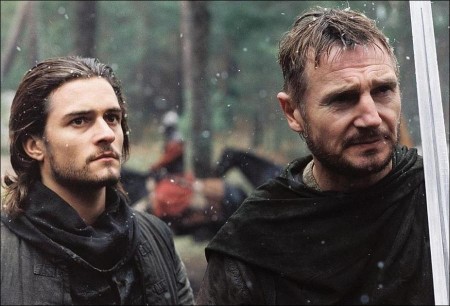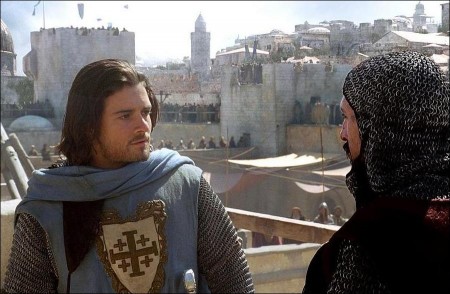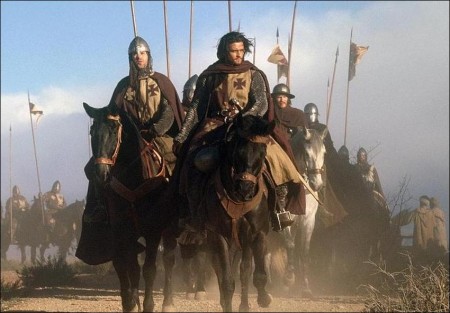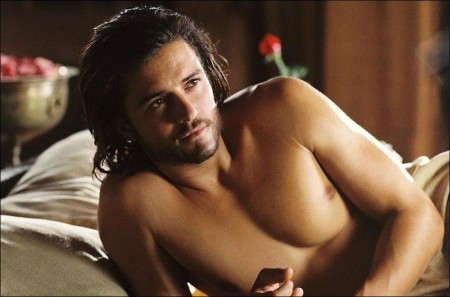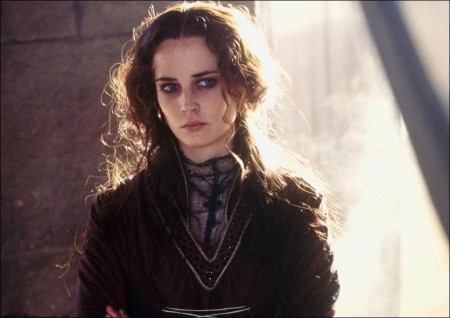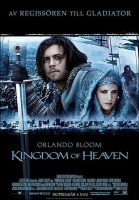Set in the 12th century, the film focuses on a young blacksmith who becomes a knight and helps defend Jerusalem against the Crusaders. There is also a love story, as the young knight falls in love with a princess.
Orlando Bloom stars as Balian, a blacksmith who has lost his family and nearly lost his faith. The religious wars raging in the far-off Holy Land seem remote to him, yet he is pulled into that immense drama. Amid the pageantry and intrigues of medieval Jerusalem he falls in love, grows into a leader, and ultimately uses all his courage and skill to defend the city against staggering odds.
Director Ridley Scott is the master of epic cinematic storytelling with a deeply personal core, as he has shown in films like Gladiator, Blade Runner, and Black Hawk Down. In KINGDOM OF HEAVEN he now turns to the Crusades — that world-shaping 200-year collision between Europe and the East — to frame the tale of a young Frenchman who discovers his destiny as a knight, then lives out what that glorious title really means.
Orlando Bloom stars as Balian, a blacksmith who has lost his family and nearly lost his faith. The religious wars raging in the far-off Holy Land seem remote to him, yet he is pulled into that immense drama. Amid the pageantry and intrigues of medieval Jerusalem he falls in love, grows into a leader, and ultimately uses all his courage and skill to defend the city against staggering odds.
Destiny comes seeking Balian in the form of a great knight, Godfrey of Ibelin (Liam Neeson), a Crusader briefly home to France from fighting in the East. Revealing himself as Balian’s father, Godfrey shows him the true meaning of knighthood and takes him on a journey across continents to the fabled Holy City.
In Jerusalem at that moment — between the Second and Third Crusades — a fragile peace prevails, through the efforts of its enlightened Christian king, Baldwin IV, aided by his advisor Tiberias (Jeremy Irons), and the military restraint of the legendary Muslim leader Saladin (Ghassan Massoud). But Baldwin’s days are numbered, and strains of fanaticism, greed, and jealousy among the Crusaders threaten to shatter the truce.
King Baldwin’s vision of peace — a “kingdom of heaven” — is shared by a handful of knights, including Godfrey of Ibelin, who swear to uphold it with their lives and honor. As Godfrey passes his sword to his son, he also passes on that sacred oath: to protect the helpless, safeguard the peace, and work toward harmony between religions and cultures, so that a kingdom of heaven can flourish on earth. Balian takes the sword and steps into history.
From Ridley Scott, the master of the modern epic, comes Kingdom of Heaven, which tells the sweeping saga of the Crusades through the eyes of one man caught up in an epic struggle for an ideal. Using historical events as a backdrop for an intimate human drama, Scott, who directed the Academy Award-winning Gladiator, puts flesh on the age-old mystique of the knight errant and brings to vivid life the titanic struggle between Muslims and Christians over the Holy Land that took place a millennium ago, and echoes into the present.
Working with Scott, screenwriter William Monahan has dramatized a fascinating episode shortly before the Third Crusade, when Jerusalem and much of the Holy Land were ruled by European knights, drawn to crusading by religious fervor and the promise of land and riches in an exotic realm. Their story centers on one of those knights, Balian of Ibelin, who becomes a hero, standing firm against treachery in the Christian alliance, and leading the people of Jerusalem in a gallant defense against Saladin’s vast Saracen army.
Acclaimed for his visual artistry, complex heroes, and immersive attention to detail, director Ridley Scott has memorably created worlds on the screen, from reinventing science fiction with Alien to reimagining ancient Rome with Gladiator. Scott had been contemplating the myth and lore of the knight and all that figure personifies for the better part of two decades. “I’d always wanted to make a movie about knights and medieval times, the Crusades especially,” says Scott.
The impulse was a natural one, given the kinds of characters that interest him. Scott’s archetypal hero is an ordinary though gifted man (or woman) caught up in great events—a character who comes through hardship or tragedy to emerge as a real hero, someone who takes a stand and refuses to be moved off it. (Think Maximus, the up-from-the-ranks Roman general turned rebel in Gladiator; Deckard, the blade runner with a conscience; or Alien’s Ripley.) “Historically, the knight—like the cowboy or the policeman — represents a person on the leading edge of his culture at a particular time,”
Scott says. “These figures have always given us great opportunities to tell stories that carry the attributes of a hero. And one of the most important is that the character carries with him his own degrees of fairness, faithfulness, and chivalry.” It was screenwriter Monahan who suggested to Scott a story that focused on the Kingdom of Jerusalem during the reigns of Baldwin IV and Saladin, and a young knight who emerges as its defender.
“’The knight stands for an ideal,”Monahan explains, “and the period that most illuminates that ideal would be the Crusades.” With the cry “God wills it!” Pope Urban II in 1095 urged Christian Europe into a frenzy to reclaim the holy city of Jerusalem, conquered by Muslim armies that swept through the Middle East in the 7th century. Thousands answered the call, from kings to peasants, and successive waves of Crusaders made their way eastward over the next 200 years, laying siege to ancient cities, founding kingdoms, and sowing the seeds of religious conflict for centuries to come.
Jerusalem was retaken in the First Crusade (there were eight in all), and several generations of Christian princes ruled there. But by the year 1186—when our story opens—the kingdom was rife with dissension, and Saladin’s growing power threatened its very existence, maintained only by replenishing the garrisons with fresh forces from Europe. A king’s vassal like Godfrey might return to his homeland to recruit new fighters for the Holy Land. Godfrey, of course, has another mission. The story’s focus is the young blacksmith Balian, whose talents go well beyond the crude forging of iron.
“Balian is an artificer, an engineer,” explains Orlando Bloom, whose roles in The Lord of the Rings trilogy, Pirates of the Caribbean, and Troy launched the young actor into global superstardom. “He has the ability to look at a castle and understand how it would best be protected, which becomes useful to him later in his journey.” As the story begins, Balian is in despair, what Bloom calls a “nihilistic state. He has lost his wife. He has lost his child. You meet a man who is in hell, essentially.” It is at this moment that a knight appears with his band of brothers. Liam Neeson stars as Godfrey of Ibelin, who left France to become a Crusader and whose bravery and integrity have earned him a place close to King Baldwin.
“When these Crusaders took over Jerusalem, they became very powerful men,” says Neeson. “They were given large grants of land. They became like little kingdoms within themselves. Godfrey is a leader and a soldier, and was given a large piece of land outside of Jerusalem.” Godfrey has returned to France to find his son. “He knows he has a son,” says Neeson. “He has never met the boy because Balian came from an affair Godfrey shouldn’t have had with Balian’s mother. But Godfrey has come back to find Balian and ask him to come to Jerusalem.”
“He doesn’t offer him land,” adds Bloom. “He doesn’t offer him money. He offers him family. He offers him the chance to be his son, working for him in the Holy Land.” Though initially Balian resists Godfrey, circumstances leave him no alternative but to join his father. “Balian is lost, essentially,” describes Bloom. “His sole purpose in going along is to find answers to the big questions hanging over his head. He is a young man on a journey of spiritual, personal, and political growth and discovery, trying to understand what life is about. He’s seeking forgiveness and understanding. So he catches up with Godfrey and they set off.”
Godfrey travels with other knights, some mercenaries, and the Hospitaler, a knight-confessor, played by David Thewlis. “The Hospitalers originated in the eleventh century,” notes Thewlis. “They were a monastic brotherhood that catered to the needs of Christian pilgrims in the Holy Land. Although the Hospitaler can be a fighter, he’s essentially a pacifist.” Godfrey, says Thewlis, is troubled. “He has a very dark sorrow about him, but finds some redemption at the end of his life by finding Balian. He rediscovers some love within himself, some warmth, seeing how his heritage can be passed down to Balian for the future.”
In an ambush on the journey, Godfrey is mortally injured in battle. As a final act of redemption, Godfrey knights his son, passing on to him his mission of keeping the peace in Jerusalem. “I try to convince him to go to Jerusalem—that there is a way forward for all of us, Christian and Muslim, to come together and be civilized together,” says Neeson. “Godfrey has come to this realization only after many, many years of senseless killing.” The Hospitaler becomes Balian’s companion and counselor after Godfrey’s death.
“He presents certain questions and lets Balian find the answers,” says Scott. “He uses the words ‘right action’—doing the right thing, no matter what. That’s what he believes God is looking for. And the rest is folly. You don’t have to hear voices. You don’t have to kneel. It’s about right action.” In Jerusalem, Balian meets the cast of characters that define the city at the time. His first significant encounter is with the King’s sister, the beautiful princess Sibylla (Eva Green), who is mired in an arranged marriage to Guy de Lusignan (Marton Csokas).
“She’s quite exotic,” describes newcomer Eva Green, who made her feature film debut in Bernardo Bertolucci’s The Dreamers. “She has lived all her life in Jerusalem, brought up with Christians, Jews, and Muslims. But she has been living in quite repressive circumstances. Her mother put her into an arranged marriage against her wishes. She hates her husband; she doesn’t respect his values or his pursuit of power. Sibylla and Balian are helplessly drawn to one another, despite political complications.
“Balian is not looking for love,” says Bloom, “but he falls very deeply in love, because Sibylla is this incredibly intoxicating, otherworldly creature to him. It’s a very emotional relationship, something he’s yearning for and yet is reluctant to fall into. Meeting this woman ignites a flame of hope for him.” Green believes that Sibylla finds some sanctuary in her relationship with Balian, and he with her. “At the beginning Balian is in a period of mourning,” she says. “He’s confused about his life, about his faith. And Sibylla is the other extreme. She wants somebody virtuous in her life. She wants harmony. When they meet, there is a strong attraction. He is so pure, so faithful, noble. He’s the ideal man for her.”
Sibylla is also very fearful for her brother, Baldwin. “She can’t face the truth that he is going to die,” says Green. “He’s the only person she can really trust.” King Baldwin IV, like his namesake in history, is a good and just king doomed to die young from leprosy; the disease has advanced so far that he must hide his face behind a silver mask. “Baldwin was incredibly strong and stalwart, but he has been debilitated by this leprosy, and his death is imminent,” says Scott. When they meet, Baldwin makes it clear to Balian that, as the new Lord of Ibelin, he is to continue his father’s mission of defending the road to Jerusalem so that it remains open to pilgrims of all faiths.
“All are welcome,” says Bloom, “not because it is expedient, but because it is right. ” Balian also meets Tiberias, the King’s wise and tough military advisor, played by Jeremy Irons. “He is the marshal of the Jerusalem army,” explains Irons. “His boss, King Baldwin, is a leper. It’s a fairly advanced condition, and as a result he’s not able to command the kingdom as he would wish, so he relies a great deal on Tiberias.”
Tiberias makes known to Balian the tenuous peace under which Jerusalem exists, beset by conspiracies within and Saladin’s 200,000 troops surrounding the kingdom. Tiberias has as much respect for Muslims as he does for Christians, notes Irons, and he often finds it necessary to remind citizens of the respect they must accord each other. “He is really a man at the end of his career who is tired of fighting and of the stupid behavior that surrounds him in Jerusalem.” The truce between Baldwin and Saladin (Ghassan Massoud) is constantly under threat by conspiracies within the kingdom.
“There is an array of complex itineraries in Jerusalem, a lot of them self-serving,” says Scott. Confusion, cross-politics, and corruption thrive, “all being delicately balanced by King Baldwin and Tiberias,” he adds. “Everyone else is pushing and shoving after their own agendas.” The charismatic leader of the Saracens, Saladin is played by Syrian actor and filmmaker Ghassan Massoud, who has himself directed The Diplomats, a satirical play that touches on problems of leadership in the Arab world. Massoud sees Saladin as first and foremost a statesman. “And second, he is a man of war,” says the actor. “Saladin is the winner of many battles. At the same time, he makes dialog with the enemy. It’s a very important point for the leader at this time. He is a very charismatic character, yet very human. And very sweet from the inside. He believes in dialog with his enemy.”
“Saladin is revered as a great Muslim leader, as a politician, a gentleman, and a great strategist,” adds Scott. “And it wasn’t just the Saracens that adored him. He was very respected by the other side. ” Adds Massoud, “Balian and Saladin come to respect each other in the story.” Guy de Lusignan, Sibylla’s husband, is a member of the Knights Templar, a military/religious order.
“The Templars are an extreme faction that do not want any relationship with the Muslims,” explains Scott. “They don’t want peace.” “Guy is a military commander in the army of Jerusalem,” says the actor who portrays him, Marton Csokas. “The King is inept as far as Guy is concerned, because Guy is a military person. He wants to get out there and fight, if not for the sport of it, certainly for the power his achievements might win him. He’s a glory hunter. His desire for power is enormous. He is in many ways the opposite of Balian.”
Guy is also in love with Sibylla, though she detests him. “He’s at a loss there, both politically—because they’re not a unified force—and in his personal life, because he lacks what most of us need, which is love and domestic arrangements,” says Csokas. Guy’s co-conspirator in extremism is Reynald de Chatillon, who has a massive fortress at Kerak. (Its ruins still stand today, in present-day Jordan some 50 miles southeast of Jerusalem.) “Reynald revels in mayhem,” says Brendan Gleeson. “He is malicious and savage, but at the same time has this daft notion of chivalry. In a way, he is everything that was wrong with the Crusades. These were the people that made the Crusades a mad, imperialist, xenophobic kind of hedonism. Everything Reynald does is driven by avariciousness and lust.”
With their impetuousness and urge for chaos and domination, Guy and Reynald set off a chain reaction that will inevitably lead Jerusalem into war with the Saracens. As the end of Baldwin’s reign nears, Reynald is only too happy to fall in with Guy’s scheme for taking power. The tipping point comes when Guy murders a Saracen messenger in cold blood. “That’s pretty much the end, not just for Guy but for everything Baldwin and Saladin have been trying to maintain, which is a pluralism and a society of tolerance,” says Csokas. “He gets what he wanted, along with the consequences.”
Guy’s final act of folly is to lead the Army of Jerusalem out of the city to confront Saladin’s vastly superior force at the Battle of Hattin, where the Christian knights are annihilated. We don’t see that battle, because the climax of the film’s story occurs afterward, when Saladin brings his army to the walls of Jerusalem. Faithful to his knight’s code, Balian takes it upon himself to defend the city, and with his skills as a leader and engineer, turns the city into a fortress. Ultimately it’s a fight he cannot win, with only a small number of fighters to stave off an army 200,000 strong. But he triumphs in uniting the defenders and in negotiating their survival.
“Before that,” says screenwriter William Monahan, “the defenders within Jerusalem are in a state of disunity. And they’re confronting an intensely unified enemy.” “Baldwin and Saladin would keep the peace if it were up to them,” says Orlando Bloom. “If it weren’t for the fanatics like Reynald and Guy de Lusignan, who are bloodthirsty and power-hungry, Jerusalem could have been a place where people come to worship, a place of peace, of mutual respect for other beliefs and practices, whatever they may be.”
Balian is a man who takes the title of knight with a gravity that others do not, Monahan points out. “You’re defined by your actions—not what you say, not what you claim to be, but what you do,” he says. “The movie is built from the code of knighthood. As Ridley has said, the film is about using your head and your heart.” “The kingdom of heaven is not what you might expect,” adds Bloom. “It’s not in some afterlife. It’s a place where you can be who you were born to be, where you can be true to yourself. It’s a kingdom of conscience. It’s a kingdom of hope and of unity. It’s an ideal of a world we all should strive for, a world of peace.”
From Conception to Production
Ridley Scott had been developing a project called Tripoli with screenwriter William Monahan when they began to discuss making a film about some aspect of the Crusades. “It’s a very rich time in history,” says Scott. “If you examine those 200 years historically, you see every possible shade of human behavior. You can go in and almost surgically choose the moment you want to explore.”
The sensitivity and perceptiveness of Monahan’s script, in the hands of an admired filmmaker like Ridley Scott, attracted much of the talent that would populate and create the film. “It is an era which has a lot of parallels in today’s world: how the Christians deal with the Muslims, how the Muslims deal with the Christians, how they use each other, what their real agendas are,” comments Jeremy Irons. “This story has reverberations for today.” Scott stresses that he was creating a film story based on history, not a documentary. Kingdom of Heaven uses historical events as a canvas on which to paint a rich human drama.
“We’ve chosen a point in history in which we see a state of peace, which we don’t seem to be able to attain today,” he notes. “That’s what’s fascinating about it. We try to show both sides in a balanced light. The hero, Balian, is a man concerned most with ‘right action’ and what that means. And one of the strongest characters in the film is Saladin, who is played by a Muslim.”
Monahan had long been fascinated by the Latin Kingdom of Jerusalem, especially the reign of Baldwin IV. “It was a period of equilibrium between the Crusader state and the Muslims,” he notes. “There is a balance of power. It is partly a practical truce, but there is also a kind of fascination between the cultures.” The mutual respect for peace is maintained by King Baldwin IV and Saladin, who are both at odds with extremists in their respective camps. Monahan worked from primary sources, using firsthand accounts (in translation) by people who were present while history was being made, and avoiding interpretations written over the subsequent centuries. His research revealed that King Baldwin and Saladin did indeed achieve an unprecedented truce between their societies, during which all three of the great monotheistic religions were practiced freely in Jerusalem.
“King Baldwin really followed the Muslims’ lead, when they had controlled the city, in allowing those of other faiths to practice their religion,” Scott points out. “Anyone could come and go as they pleased, and worship as they pleased.” At the time the film opens, the truce is working. “Trade is going back and forth,” comments Monahan. “People are coexisting. The Latin Kingdom has stood for almost a hundred years at this point. And it’s only a mistake—greed, ambition, fanaticism—that begins to shake it.”
Casting the Kingdom
“I got to live every boy’s dream,” says Orlando Bloom. “A knight, quite simply, gets the girl, gets to be everything he is meant to be. Balian is a reluctant hero on a quest, which is the best kind of hero, for my money.” Ridley Scott and Bloom had previously worked together on the director’s film Black Hawk Down. “Orlando is a very honest, outgoing person,” says Scott. “That’s who he is. He’s also very good physically in the field. He fell out of a helicopter for me in Black Hawk Down. He can do all the things that I required him to do, but I think his honesty and earnestness give him a distinct level of authenticity in the role of Balian.”
“I felt so privileged to be surrounded by this cast and to work so closely with Ridley,” says Bloom. “To see how he works and create something with him. He has this uncanny ability to take history and merge it with contemporary society’s idea of what they want in a movie; he juxtaposes politics with truth, and if you come from truth you really get to the crux of the matter. His films are a feast for the eyes, but they also leave you questioning and wondering, with a sense of purpose. It’s truly extraordinary and I feel incredibly lucky.”
Eva Green was chosen to portray Sibylla because the film needed an especially strong female presence to stand out in this almost exclusively male world. “Eva is in her early twenties, but she carries an old soul, which I guess is maturity,” comments Scott. “She has great judgments and fantastic intuition.” “Ridley is such a humble person,” observes Green. “As massive in scope as this film is, he makes it very easy and very simple to work with him. He also understands how vulnerable an actor can be and creates an atmosphere of security around you. His calm and energy make you stronger. He never shows a moment of anxiety or tension.”
Many in the stellar cast accepted character roles on the basis of Monahan’s script and the chance to work with Scott. Jeremy Irons, who appeared in a commercial directed by Scott two decades ago, actively sought out the director after reading the script. “It was everything you want a big action movie script to be,” he says. “I wanted to be a part of that. If you’re going make a big movie, with heart and with enormous potential for huge things happening, the director you want to work with is Ridley. I think he is making a film unlike anything he’s done before.”
“Because of the extreme power and scope of Ridley’s visual talent, people lose sight of the fact that he’s a great actor’s director,” says screenwriter Monahan. “You see this from the earliest days with Alien, which is a masterpiece of ensemble playing.” Scott insisted that all the Muslim roles be played by Muslim actors. Ghassan Massoud and Khaled Nabawy, who portray Saladin and the fanatical Mullah, are major stars in the Arab world.
“It is a very special experience for me to work with Ridley on this film,” comments Massoud. “It must be a very special experience for any actor from the East to play with a director like Ridley Scott. We respect how he thinks about this film, about the characters and the story.” To play Guy de Lusignan, who comes closest to being the villain of the piece, Scott sought an actor who could credibly portray ruthlessness fueled by a wayward love. Guy’s shocking acts of violence are always tempered with a vulnerability that inspires some empathy.
New Zealand-born Marton Csokas feels that what makes this epic so powerful is its intimate view of the characters. “You have to begin with the interpersonal stories,” says Csokas. “Otherwise it would just be a big show-and-tell of much bluster. Ridley knows it’s far more interesting to examine the lives that go on in that world.” All the actors undertook their own research about the era, about the characters they’re playing, the customs and culture. Massoud had studied Saladin’s life extensively through Eastern and Western sources, reading thousands of pages on the subject.
“A lot of people will watch this film because Saladin is history,” says Massoud. “He is a very rich memory for Islamic culture and the Arab world, but also in the West, in England, France, and America. When people see this film, they will wonder, who is this man?” Massoud feels that the character was painted by the screenwriter and director with great balance. In some cases, they and Massoud discussed making adjustments to the story based on what he knew of Saladin and Muslim customs.
“In my discussions with the director I learned that the English have a great deal of respect for Saladin as a noble foe to Richard the Lionheart,” he says. Liam Neeson was always in Scott’s mind to play Godfrey of Ibelin, the hero’s father. The role he took on in the film carried over naturally into the cast interactions as they made their way across locations in Spain and Morocco.
“When you have this many actors, they form a community very quickly,” Scott notes. “Liam was always a kind of leader to that little group. Even though he’s not that different in age from a lot of the cast, he was very much a father figure to many of them.” To convincingly recreate the medieval world, Scott populated it with a vast array of extras. In one scene alone, at King Baldwin’s palace, the extras included beggars, Hospitaler knights, Army of Jerusalem knights, guards, palace nobles, priests, monks, the Muslim Grandee’s bodyguards, musicians, mullahs, Saracen clerics and soldiers, servants, and grooms.
Bringing the Past the Life
The massive production effort that brought Kingdom of Heaven to the screen involved months of meticulous research, painstaking design work, and tight coordination of crews in several countries. But it all grew out of sketches on scraps of paper. A supremely visual filmmaker, Scott storyboards in his head as he reads the script.
“When you’re working with Ridley, when you’re talking about a script or story, he draws almost continually,” comments Monahan. “He’ll draw a frame, draw what he intends to see inside it. If you’re paying attention when you see the little bits of paper on the table, you can piece together what it’s going to look like. But nothing can really prepare you for something of this scale. Its magnitude was enormous. It was like some sort of a military operation.”
“Ridley’s canvasses seem to be getting bigger and bigger,” comments production designer Arthur Max. “But it seems like the stories are getting more intimate. A seemingly ordinary person is suddenly swept up into a huge historical tableau where he is surrounded by historical characters that we all know, but it’s seen and told through the eyes of someone who has been living a very normal life.” Scott called on an experienced cadre of creative heads, including Max, to help him create fully realized medieval worlds on a short schedule.
“There’s an automatic ethic of research,” says the director. “Everyone leaps in and is very well prepared.” After location scouting and assembling a massive library of references, Max created models of the main set pieces that he could look at with Scott to decide the final shape of what they were to create. Then the drawing phase began, with over 1,000 drawings being created by the art department in Rome. “It’s a game we all like to play, to create worlds out of not only the research, but out of the imagination,”
Max continues. “It’s not just the façade of a building. We try to make this a kind of labyrinth—a piece of old Jerusalem, or a piece of the fortress of Kerak, or a piece of the village at Ibelin. Whether it’s a palace or a simple village environment, we try to give them a kind of common reality, so that you’re carried away with the telling of the story and the context in which the story takes place. “Also, I think the actors feel the period more if they can meander through a total environment, where you have real life taking place on lots of different levels, not just a big, impressive wall, devoid of any texture or smell. The set is a living place. We try to give the streets of Jerusalem a variety of life as it would have gone on at the time of our story.”
These production notes provided by 20th Century Fox.
The Kingdom of Heaven
Starring: Orlando Bloom, Liam Neeson, Jeremy Irons, Eva Green, Marton Csokas, David Thewlis, Brendan Gleeson
Directed by: Ridley Scott
Screenplay by: William Monahan
Release Date: May 6th, 2005
MPAA Rating: R for strong violence and epic warfare.
Studio: 20th Century Fox
Box Office Totals
Domestic: $47,398,413 (22.4%)
Foreign: $164,253,638 (77.6%)
Total: $211,652,051 (Worldwide)
